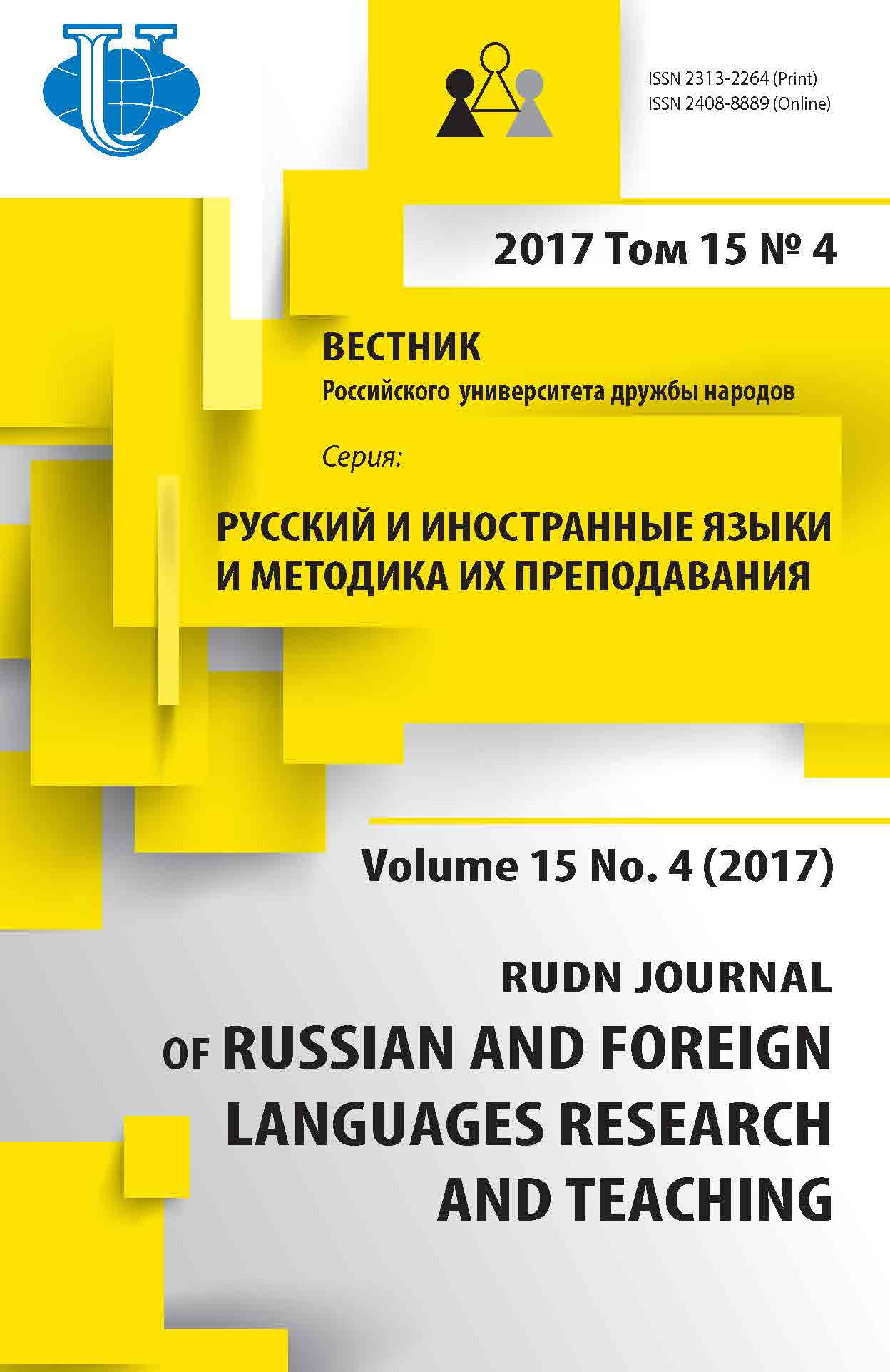THE LEGACY OF ACADEMICIAN A.I. SOBOLEVSKY IN THE SCIENTIFIC CULTURE OF RUSSIA (160TH ANNIVERSARY OF HIS BIRTH)
- Authors: Nikitin OV1
-
Affiliations:
- Moscow State Region University
- Issue: Vol 15, No 4 (2017)
- Pages: 371-388
- Section: Articles
- URL: https://journals.rudn.ru/russian-language-studies/article/view/17444
- DOI: https://doi.org/10.22363/2313-2264-2017-15-4-371-388
- ID: 17444
Cite item
Full Text
Abstract
The article examines the legacy of the outstanding Russian linguist academician A.I. Sobolevsky (1857-1929), one of the founders of the historical study of Russian literary language and diachronic lexicography. As a representative of the traditional comparative studies he made a number of discoveries in the field of Slavic Philology and dialectology, etymology and paleography. Academician A.I. Sobolevsky contributed to the cause of public education and in the study of complex problems of the Ethnology of Slavs. His works are based on rich factual material and contain new linguistic information, they are still the authoritative in an academic and scientific practice and are examples of a historical-linguistic analysis of ancient texts. In the work, along with philological emphasis, we have presented a panorama of the social, historical and cultural events and circumstances that were involved academician A.I. Sobolevsky: we talk about a complex period of academic activities during the October revolution, about his classes and worries and overall perception of the new social environment that is alien to the classical Professor of the old school. The facts stated in the article, first open almost chronicle pages of the severe trials that befell the pre-revolutionary academic science, which tried to preserve the best traditions of Russian Philology.
About the authors
O V Nikitin
Moscow State Region University
Author for correspondence.
Email: olnikitin@yandex.ru
Nikitin Oleg Viktorovich, Doctor of Philology, Professor at the Department of History of Russian and General Linguistics of the Moscow State Regional University. Research interests: history of linguistics, Slavic studies, lexicography, sociolinguistics, history of Russian, lingua-cultural studies. Author of over 300 scientific publications.
Radio str., 10a, Moscow, Russia, 105005References
- Astakhina, L.Yu. (2001). The history of the Catalogue of “The Dictionary of Russian of XI—XVII centuries”. Moscow. (In Russ).
- Barankova, G.S. (2001). Grigory Andreevich Iljinskii (1876—1937). Russian speech. 2. (In Russ).
- Bulakhov, M.G. (1978). East-Slavic linguists: Biobibliographic dictionary. Minsk: BGU V.I. Lenina Publ. (In Russ).
- Durnovo, N.N. (1930). Academician Alexei Ivanovich Sobolevskii. Necrology. Slavia. Roč. VIII. Seš. 4, 830—836. (In Russ).
- Zelenin, D.K. (1930). A.I. Sobolevskii as ethnographer. O.V. Nikitin, Izvestija AN SSSR. 1. Otdelenije gumanitarnyh nauk Publ. (In Russ).
- Lyapunov, B.M. (1930). A.I. Sobolevskii’s studies on the history of East-Slavic languages. Izvestija AN SSSR. 1. Otdelenije gumanitarnyh nauk Publ. (In Russ).
- Nikitin, O.V. (1999). Problems of studying of Russian business script in scientific views of V.V. Vinogradov. 2. Issues of linguistics. (In Russ).
- Nikitin, O.V. (2004). Business correspondence in the history of Russian (XI—XVIII cent.). [Author’s abstract of doctoral diss.]. Moscow: MGOU Publ. (In Russ).
- Nikitin, O.V. (2006). Alexei Ivanovich Sobolevskii (150th anniversary of his birth). Russian at school. 6. (In Russ).
- Nikitin, O.V. (2007а). Alexei Ivanovich Sobolevskii. Russian Speech. 6. (In Russ).
- Nikitin, O.V. (2007b). Alexei Ivanovich Sobolevskii. Moskovskii zhurnal. Istorija gosudarstva Rossijskogo [Moscow journal. The History of the Russian State]. 1. (In Russ).
- Nikitin, O.V. Nestor of Slavic philology. About Academician Alexei Ivanovich Sobolevskii. Retrieved March 24 2017 from: http://www.portal-slovo.ru/philology/39037.php
- Perets, V.N. (1930). Academician A.I. Sobolevskii. Izvestija AN SSSR. 1. Otdelenije gumanitarnyh nauk Publ. (In Russ).
- Collection of articles devoted to academician Alexei Ivanovich Sobolevskii. (1928). Leningrad: Academy of sciences of USSR Publ. (In Russ).
- Sobolevskii, A.I. (1891). Church-Slavonic language. Phonetics. Мoscow: University Publishing House. (In Russ).
- Sobolevskii, A.I. (1892а). Church-Slavonic poetry of late IX — the beginning of X centuries. Saint Petersburg: Bibliograph Publ. (In Russ).
- Sobolevskii, A.I. (1892b). Education in Moscow of XV—XVII centuries. Speech. Saint Petersburg: A.M. Volf Publishing House. (In Russ).
- Sobolevskii, A.I. (1897). An experience of Russian dialectology. Part I. Russian and Belarusian dialects. Saint Petersburg. (In Russ).
- Sobolevskii, A.I. (1903). Foreign literature in Moscow of XIV—XVII centuries. Bibliographic materials. Saint Petersburg: Imp. Acad. of Sciences Publ. (In Russ).
- Sobolevskii, A.I. (1906). The Gramma by I. Uzhevich of 1643. Kiev: G.G. Meinander Publishing House. (In Russ).
- Sobolevskii, A.I. (1907). Lectures on the history of Russian. Мoscow. (In Russ).
- Sobolevskii, A.I. (1909a). Slavic studies in the Russian high school. Saint Petersburg: V.D. Smirnov Publishing House. (In Russ).
- Sobolevskii, A.I. (1909b). Gogol in the history of Russian ethnography. Kharkov: Mirnyi trud Publ. (In Russ).
- Sobolevskii, A.I. (1911). Russian folk as ethnographic unity. Kharkov: Mirnyi trud Publ. (In Russ).
- Sobolevskii, A.I. (1927). Etymological issues: On the Slavic Etymological Dictionary. Slavia. (In Russ).
- Sobolevskii, A.I. (1930). Searching the traces of the Vikings. Slavia. Roč. VIII. Seš. 4. (In Russ).
- Sobolevskii, A.I. (1980). History of Russian literary language. A.A. Alexeev (Ed.). Leningrad: Nauka Publ. (In Russ).
- Sobolevskii, A.I. (2004—2006). Papers on the history of Russian. 1–2. Мoscow: Jazyki slavyanskoj kultury Publ. (In Russ).
- Sobolevskii, A.I. Orthodox-patriotic calendar “Russian Power”. Retrieved June 24 2017 from: http://www.rusk.ru/ppcalendar.php?date=2006-05-24
- Tseitlin, R.M. (1979). Alexei Ivanovich Sobolevskii. Slavic studies in pre-revolutionary Russia: Biobibliographic dictionary. Мoscow. (In Russ).
Supplementary files














